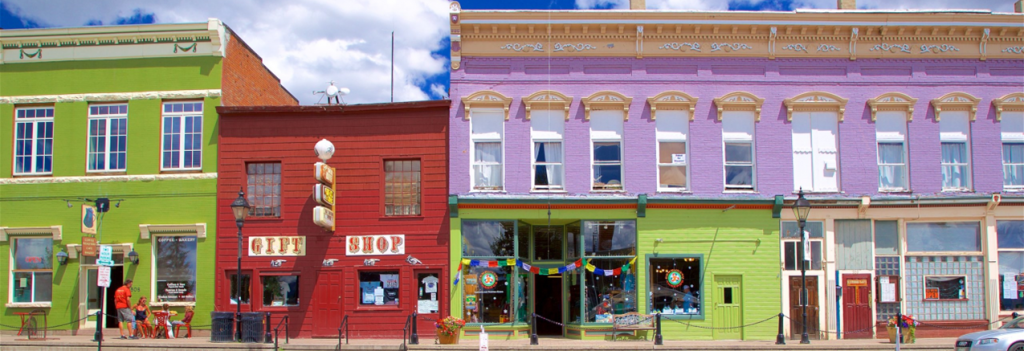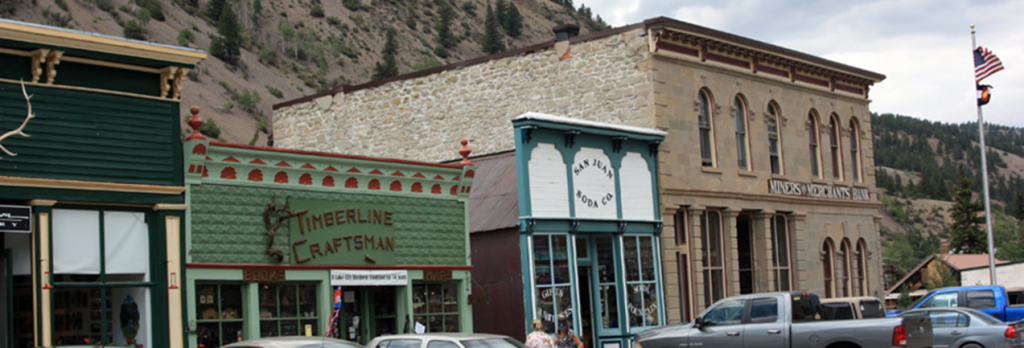
Colorado Preservation, Inc. (CPI) received an award from the National Park Service Paul Bruhn Historic Revitalization Grant to develop a subgrant program to support and stimulate historic preservation projects in Colorado’s rural historic downtowns. This subgrant program aims to broaden support and understanding for preservation by fostering key projects to spur and maintain local property investment, especially among private property owners. Private Property owners, nonprofit organizations, and municipalities are eligible to apply.
Grant Program Overview
- Approximately $612,000 is expected to be awarded in grant funding in 2023
- The maximum grant award amount is $150,000
- The minimum grant award amount is $10,000
- Awarded recipients will be required to pay 25% match on the grant award (note the nonprofit & private property owner match is the same). In-kind match is allowed as long as invoices come from qualified contractors.
- Recipients of grant funds awarded for the physical preservation of a historic property are required to sign an agreement placing either a five(5) year Preservation Agreement (does not need to be recorded with the deed) for awards up to $50,000 or a ten (10) year easement (recorded with the deed) for grants over $50,000.
- All projects funded through this program must meet the SOIS.
- Grants are only available in Colorado communities defined as rural (population of 50,000 or less)
- Properties must be listed or eligible for listing on the National Register or a contributing building within a National Register Historic District. Eligible properties must be listed in the National Register by the end of the grant period (2025) in order to be eligible for grant funding.
- Private property owners, non-profit organizations, government entities, and educational organizations are eligible to apply.
Whose is Eligible to Apply?
Eligible entities for the grant program include private property owners, municipal governments, county governments, councils of government (COGs) and nonprofit organizations. CPI encourage these entities to partner with nonprofit Main Street communities, Downtown Development Authorities, chambers of commerce, and others to promote and possibly administer the program, but this is not required.
Eligible properties must be listed on the National Register, eligible for listing, or a building listed as contributing to a National Register Historic District. If a property is deemed eligible for listing, funding would require a Determination of Eligibility for the SHPO and the property would need to be officially listed on the National Register by the end of the grant period (by 2025).
Eligible communities must be considered rural – defined as a 2020 census population of 50,000 or less.

What Types of Projects are Eligible for Funding?
Improvements and/or rehabilitations must comply with all state and local regulations, including obtaining any required building permits and design and/or historic preservation approvals. All project work on historic buildings shall follow the Secretary of the Interior’s Standards for Rehabilitation of Historic Structures and applicable local regulations.
Eligible Projects Include: Roof Repair/Replacement, Structural Repairs, Foundation Work, Façade Restoration or Repair, Window Restoration or Repair Door Restoration or Repair
Examples of Eligible Façade Improvements Include: Removal of non-historical false fronts, Repair or replacement of windows, doors, and cornices, Repair or replacement of façade materials, Repair of character defining architectural features, Masonry maintenance including tuck-pointing and gentle cleaning of and paint removal from brick (NOT power-washing of brick), Exterior painting
APPLY TODAY!
Applications open Monday, April 10, 2023

All complete applications must be submitted to CPI by 5pm on June 10, 2023 to be considered for funding.
Applications may be submitted by mail (Attn: CPI Rural Revitalization Grant, 1420 Ogden St, Suite 104, Denver CO 80129) or emailed to [email protected]
Draft applications may be submitted for comment by May 15, 2023
View the grant application below:
Grant Selection Process:
CPI anticipates a highly competitive application process in the awarding of the $612,000 to historic preservation projects in rural communities across Colorado. The goal of the grant program is to create a significant impact in Colorado’s rural historic communities. Applications will be reviewed by the Grant Review Committee and ranked for funding based on the following criteria.
A. Project Description – 15 Points
The project description should thoroughly describe all work elements of the project. CPI will award projects with strong potential to spark economic revitalization, jobs, and preservation “how to” examples. Project descriptions should be a clear description of the project with an end use noted.
B. Location – 10 Points
The goal of this grant program is to support preservation projects in rural communities statewide. Priority will be given to rural communities with limited ongoing preservation projects. Final awards will reflect geographic diversity.
C. Community Impact – 20 Points
The grant will award catalytic projects in rural communities across Colorado. Projects that demonstrate a strong impact to the community will score high. Scoring should consider how the project will enhance the value of the building and increase value to the community. Scoring considers overall public benefit.
D. Urgency of Funding – 10 Points
This category considers how urgent the project is and how critical the grant funds are for the project. Urgency should be demonstrated but also demonstrate additional funding identified.
E. Effect on Historic Preservation Ethic – 15 Points
The grant program hopes to affect the historic preservation ethic in rural communities by giving additional incentives for National Register listing. Scoring will consider the community’s existing preservation ethic and the project’s ability to increase awareness of the benefits of historic preservation among other things.
F. Ability of Applicant to Complete Project on Schedule – 30 Points
Considers risk assessment of the applicant to complete the project as described and projected. This should also look at the administrative capability of the individual managing the grant funds as well as the overall budget to ensure it is accurate. Project demonstrates strong project team with a clear timeline and understanding of the Secretary of the Interior’s Standards.
Bonus Points

Property Ownership – 25 BONUS Points
Limited funds are available to support private property owners with historic buildings. Bonus points will be awarded to projects privately owned.
BIPOC – 20 BONUS Points
Projects tied to traditionally marginalized and underrepresented individuals/communities will receive bonus points. This includes projects that reflect Black, Indigenous, People of Color (BIPOC) resources whether this be through a building’s history, current ownership, current use, or anticipated future use.
Preservation Partners & Incentives – 10 BONUS Points
Applications supported by overlap of other statewide partner programs such as the Department of Local Affairs (DOLA)’s Colorado’s Main Street Program (CMS) and Certified Local Government (CLG) communities, as well as communities with CPI’s Endangered Places Program (EPP) listings, will also receive priority.
Questions?
Contact CPI’s Executive Director, Jennifer Orrigo Charles at [email protected]



